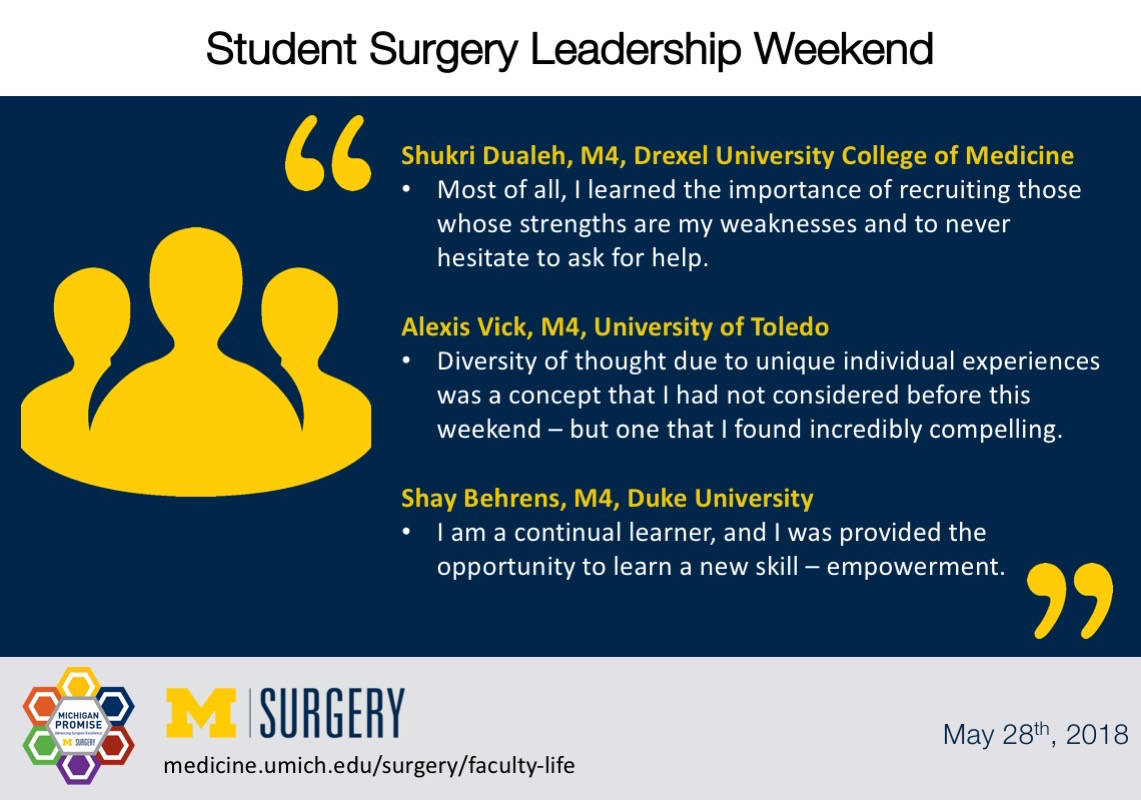
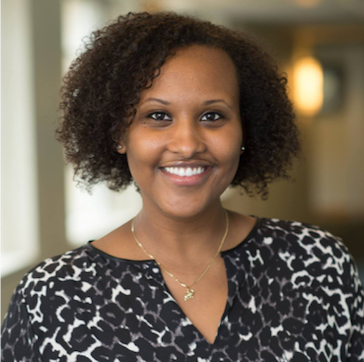
My name is Shukri Dualeh, and I am a 4th year medical student at Drexel University College of Medicine in Philadelphia, PA preparing to enter the field of general surgery.
My passion for treating the sick is rooted in preclinical experiences in my home country, Somaliland, where I helped coach expectant mothers through labor and assisted with births. A few years later, while on clinical rotations, I discovered that I could best create change by becoming a surgeon with a skill set that could bridge barriers to health care. In May 2018, I had the privilege of attending the Student Surgery Leadership Weekend at the University of Michigan and I haven’t stopped thinking about it since I left. It was incredible meeting students from across the country with different talents and views of life. In order to increase diversity, we not only need people from different cultures but we also need those from different educational backgrounds, those who are at different stages of life, and have had different paths to surgery. A central premise of the Michigan Promise is that diversity leads to more productivity, but that can only be possible if people feel like they belong. Creating a safe environment to share ideas, and acting with compassion and empathy make a team feel empowered and valuable. The student surgery leadership weekend taught me that being a leader means you get down to the ground level and work alongside your teammates. It taught me how to recognize my own unconscious biases and overcome them in order to prevent perpetuating misconceptions. Most of all, I learned the importance of recruiting those whose strengths are my weaknesses and to never hesitate to ask for help. An environment like this is where ideas can flourish.
I am excited to utilize the tools I learned to be an inclusive leader this upcoming academic year as President of the Student Government Association. I also plan to continue practicing inclusive leadership as I progress in academic surgery. Not only is there the chance to conduct research in the field of my interests, but I also have the opportunity to inspire a new generation of learners and surgeons. It is for this reason that I aspire to become a residency program director so that I may further implement diversity, equity and inclusion into the field of general surgery as well as empower new residents to serve as leaders throughout their careers. The basis of the Michigan Promise should be a promise that every institution in the nation implements and holds dear. As a student soon to enter the world of general surgery, it’s comforting to know that there are institutions such as the University of Michigan that share my passion for diversity and recognize the significant ways that patients and physicians may benefit from such an environment.
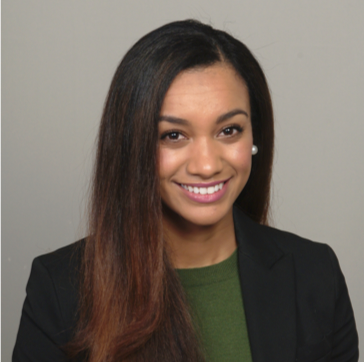
I’m Alexis Vick, a fourth year medical student at the University of Toledo.
Increasing diversity in healthcare is a mission that has gained significant recognition over the last few decades. Although progress has been made, major goals remain unfulfilled in the field of surgery. Thoughtful planning and committed leadership are needed to push past words on a page to achieve true diversity and inclusion. The University of Michigan has made meaningful strides towards advancing this effort by not only internal faculty education and inclusion parameters for faculty recruitment but by also impacting the country through the dissemination of their programs and ideas. This purposeful intent was demonstrated through the recent Surgery Leadership Weekend conference. Throughout the weekend, focused workshops highlighted diversity, its importance, methods to be more inclusive, and barriers such as unconscious bias and personality conflicts. Authentic testimonials from students and faculty about their personal experiences with diversity and inclusion were shared.
The weekend was truly moving and eye opening. My experiences as a biracial woman from Wyoming have created a unique awareness of and empathy for different cultures. Yet, throughout the weekend I learned that it is not the bubble I fill in to declare my race, the states I lived in, or my socioeconomic status that adds to my value as being “diverse.” It is our collective experiences as diverse persons that contribute to different thought processes and therefore various interpretations, approaches, and solutions when confronted with a problem or setback. While I always understood the value of diversity in helping to achieve patient-centered care, I had not considered the other ways diversity changes group dynamics.
During the Surgery Leadership weekend, I met so many amazing people: a student who taught English in Spain for years, a woman who was a nurse for 8 years before attending medical school, a truly talented medical illustrator, an ex-marine, an immigrant from Columbia, a white man, who with his white wife is raising a black son. Imagine the kind of perspectives these individuals bring and the impact they will have as leaders in surgery. It was a truly beautiful experience to witness people open up about their life journeys and witness how each had a different perspective. The weekend made it clear that diversity not only makes teams more effective, but more impactful.
Diversity of thought due to unique individual experiences was a concept that I had not considered before this weekend – but one that I found incredibly compelling. Clearly, the power of diversity is not simply about having people of different ethnicities, religions, and gender. It is the experiences diverse individuals have had, both good and bad, that contribute to their differences in thought and their ability to contribute in a different way to solving problems- ultimately improving teams and advancing the entire field of surgery.
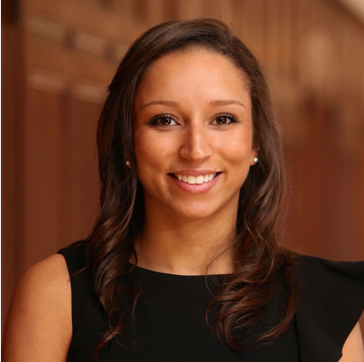
Hi, I am Shay Behrens, a 4th year medical student at Duke University.
In our journey through medicine, we are surrounded with bright, driven individuals. These individuals challenge us to become better; to be the very best that we can be. However, we may also be too quick to equate our worth to how fast we answer a question, the number of publications obtained, and a numerical board score. We use these metrics to compare ourselves to others, inevitably making us feel inadequate when we don’t meet the standard expectations.
In medicine, there is a place for doubt. It provides the ability to self-reflect, question our own judgement, fuel our curiosity, and provide an opportunity to be a continual learner. However, if too great, it may hinder abilities and result in one not reaching his/her full potential. As I found myself comparing myself to the students in the room at the recent University of Michigan Leadership Weekend, I initially felt insecure. How did I deserve to be at this highly competitive program, hearing and learning about leadership from a program that is revolutionizing surgical training? However, the focus was not on how we can get ahead but rather on leadership, and how we can work together as a team to serve our patients. One key way is empowerment.
For students who may come from underprivileged backgrounds, overcome adversity, and at times feel to be climbing uphill, empowerment can provide the confidence to succeed. Dr. Erika Newman, a pediatric surgeon, spoke of her experiences when she was a resident and how she so subtly empowered her medical student. In this situation, her medical student presented a brief research talk about the disease their patient was suffering. Dr. Newman empowered the medical student to share knowledge during rounds that morning inviting the student to be heard and to be an integral member of the team.
I hope we can all strive to carry forward this mentality in the future. An M.D. title or long-white coat seems to equate to power at first-glance, but these roles and letters are what actually enable us to empower those that surround us. As a 4th year on sub-internship, we must take the initiative to empower those third-year medical students freshly introduced to the wards. We must strive to work with them to teach suturing and proper physical exams. As an intern, we must demonstrate what Dr. Newman did: promote our trainees on rounds to exhibit their knowledge. As an attending, we must empower those who are at the training levels before us and provide an inclusive environment for all trainee levels. Empowerment will enable the shy or insecure trainee to speak up when he/she may see a medical error and provide the confidence to thrive in the training environment. We can extend this beyond the provider by empowering our patients to speak up and share questions, concerns, and comments so we can provide better care and improve outcomes.
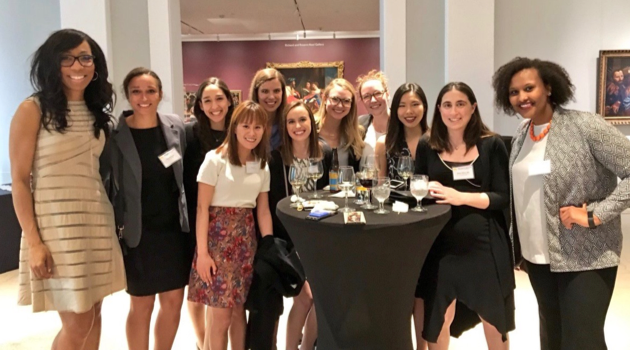
The University of Michigan Leadership Weekend went above and beyond providing standard preparation for residency; it was truly a leadership weekend. I am a continual learner, and I was provided the opportunity to learn a new skill – empowerment. I can utilize this skill to promote a collaborative team and become a more successful leader. The true leader I strive to be will work to empower my trainees and celebrate their successes over my own. It is through this empowerment and selfless leadership that we can promote and train the next generation of physicians and enable them to reach their full potential.
Contact Us
Reach out to join the conversation or to learn more about how to implement the Michigan Promise. Connect with the Department of Surgery or our faculty on Twitter to share your ideas or get in touch with the Office of Faculty & Resident Life to schedule a Michigan Promise presentation at your institution. You can also fill out our Michigan Promise Inquiry Form with any questions or comments.
Department of Surgery
2210F Taubman Center
1500 E. Medical Center Dr.
Ann Arbor, MI 48109
Phone: 734-232-5528
Email: [email protected]
Twitter: @UMichSurgery
Hashtag: #MichiganPromise

